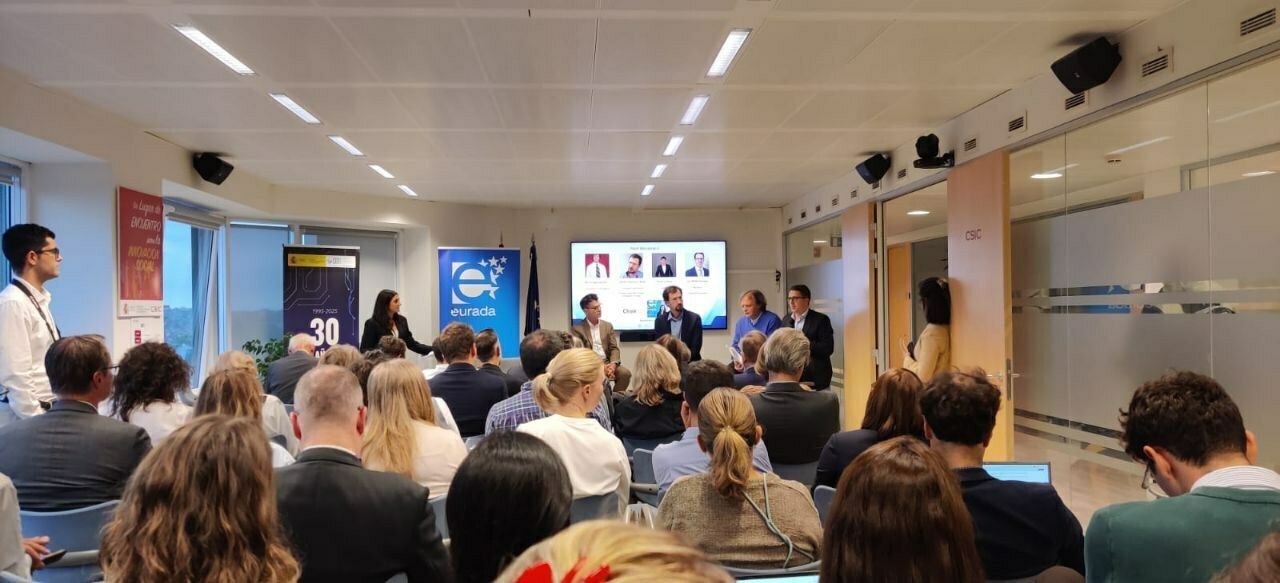What is the Future of Smart Specialisation? Key Points from the Workshop in Context of EURegionsWeek

Yesterday, October 13th, the Ukrainian participants to the European Week of Regions and Cities (EURegionsWeek) in Brussels, attended the workshop “Connecting national and regional planning to European priorities. Is Smart Specialisation still relevant in the context of the new Multiannual Financial Framework (MFF)?”, organised jointly by the European Association of Development Agencies (EURADA), the Friends of Smart Specialisation group, and the Spanish Office for Science and Technology (CDTI SOST), in the context of EURegionsWeek.
Swiss-Ukrainian project «Ukraine’s Cohesion & Regional Development», UCORD, continues to report on the participation of Ukrainian delegation in this large-scale event which gathered representatives of regions and communities from all around the EU.
As part of the delegation attended the workshop on smart specialisation strategies (S3), they were able to pull ideas from the complex process of possible adapting the smart specialisation – an innovation policy approach proved successful and effective as part of EU Cohesion Policy – to the proposal of the new MFF 2028-2034 which introduced a new architecture combining national/regional plans with a central Competitiveness Fund to create opportunities for place-based transformation strategies aligned with EU priorities.
This discussion reinforced that the foundations of Smart Specialisation remain highly relevant regardless of policy changes, as it provides a structured tool to foster innovation and competitiveness through targeted investment and evidence-based decision-making.
The speakers of the workshop included representatives of organisers – EURADA, Friends of Smart Specialisation, CDTI SOST – and also European Committee of the Regions, Directorate-General for Regional and Urban Policy, Directorate-General for Research and Innovation, Prognos research institute, European Regions Research and Innovation Network, and representatives of Brainport Eindhoven and OostNL. The key-note contribution was made by Pierre Alexandre Balland, Chief Data Scientist at Centre for European Policy Studies and visiting professor at Harvard University, set the scene and it sparked lively discussion on the future of smart specialisation in the EU.
The workshop speakers explored:
- The alignment of European and local priorities, in particular how S3 can connect EU transformation goals with regional opportunities. Speakers underlined that S3 enables regions and countries to make concrete strategic choices on which sectors and technologies to prioritise, tailoring innovation strategies to their unique strengths and economic potential.
- Cross-border collaboration, in particular the role of S3 in fostering partnerships and co-investment for the green and digital transitions. The discussion highlighted the importance of identifying strategic complementarities between regions and scaling from regional to national and international S3 collaboration to enhance resilience and competitiveness across Europe.
- The need for a standardised methodology to match innovation assets and strengthen value chains. Experts also stressed that innovation requires enabling conditions – from skills and governance to data systems – to effectively map, match, and mobilise knowledge assets across ecosystems.
- Governance and coordination, in particular the rethinking the Entrepreneurial Discovery Process and S3 planning to enhance integration across regional, national, and EU levels. It was noted that healthy competition among regions within and across countries stimulates innovation, while S3 can also help mitigate growing regional disparities through better coordination and evidence-based prioritisation.
The discussion highlighted both the challenge of redefining S3’s place in the competitiveness agenda and the opportunity to position it as a key tool for Europe’s innovation-driven, resilient, and sustainable growth. Overall, participants recognised S3 as a catalyst for building interconnected innovation ecosystems and inter-regional learning communities, supporting Europe’s long-term transformation goals.
If there’s one conclusion for Ukraine, it’s that smart specialisation is not only a much-beloved policy approach in the EU (there’s even an expert group called “Friends of Smart Specialisation”), but most importantly – a highly researched and continuously evolving approach with multiple success stories and extensive data supporting its central idea: Smart Specialisation provides an effective tool for prioritising innovation, fostering competitiveness, and creating the conditions where innovation can thrive.
The EURegionsWeek participation of representatives of six regional development agencies, the Secreteriat of the Cabinet of Ministers of Ukraine, the Ministry for Development of Communities and Territories of Ukraine, the Ministry of Economy, Environment and Agriculture, and the oblast administrations, is supported by the Swiss-Ukrainian project «Ukraine’s Cohesion & Regional Development», UCORD which is implemented with the support of Switzerland by NIRAS Sweden AB.
22 January 2026
Стартував відбір громад до другої черги проєкту «Рух без бар’єрів»
Стартував відбір громад до другої черги проєкту...
Міністерство розвитку громад та територій України розпочинає прийом пропозицій від громад для участі другій черзі...
22 January 2026
«У кожній хаті свій КРЕДЕНС»: як громади об’єднуються навколо цифрової спадщини
«У кожній хаті свій КРЕДЕНС»: як громади...
Протягом 2025 року три громади-партнерки – Горохівська та Рожищенська громади Волинської області, а також...
21 January 2026
UAH 32 million from community budget – for defence innovations: Experience of Khmelnytskyi
UAH 32 million from community budget – for...
Local self-government during wartime involves more than just maintaining stability at the rear; it also contributes...
21 January 2026
Myrhorod expands cooperation with international partners in healthcare
Myrhorod expands cooperation with international...
The Myrhorod City Council has signed a Memorandum of Cooperation with the International Organisation for Migration...